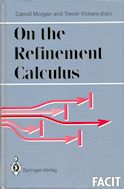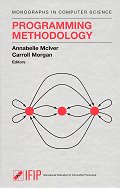Important advances in the principles for design, construction, and organization
of computer programs have enabled software to keep pace with
the remarkable advances in computing speed and memory.
In addition to allowing for an all-pervasive computing technology,
these key methods are beginning to feed back on, and influence, hardware design.
Programming Methodology is a comprehensive edited volume
that concentrates on new and emerging techniques for constructing modern applications,
while also addressing the problems software designers face
as they attempt to develop highly complex applications that actually work.
Contributions to the book are from leading academics and industrialists
of the International Federation for Information Processing’s Working Group 2.3,
whose mission is to assess methodologies for creating and improving the quality of software and systems.
The work is thematically organized into three sections:
models and correctness; programming techniques; and applications and automated theories.
Topics and Features:
• Proposes practical solutions—and their theoretical foundations—to
current software and systems challenges
• Incorporates examples from a wide range of applications,
such as security, telephony, and circuit design
• Examines challenges to systems engineering, automating theories,
and the robust design of concurrent systems
• Highlights recent technical advances in the ways that software systems are designed and verified
• Provides concise and helpful introductions to each carefully organized subsection of related material
This state-of-the-art survey on key new foundational topics in programming methodology
is an essential resource developed by leading international computer scientists,
programmers, and software systems designers.
It offers an authoritative reference and guide to modern software theory and practice
for programmers, developers, computer scientists, and software engineers.
The chapters are collected into three parts:
• Models and correctness
• Programming techniques
• Applications and automated theories
Contents
- • Cliff B. Jones. Wanted: a compositional approach to concurrency. 2003
- • Ralph-Johan Back, Joakim von Wright. Enforcing behaviour with contracts. 2003
- • Ernie Cohen. Asynchronous progress. 2003
- • Jayadev Misra. A reduction theorem for concurrent object-oriented programs. 2003
- • Manfred Broy. Abstractions from time. 2003
- • Ian J. Hayes. A predicative semantics for real-time refinement. 2003
- • Michael Jackson. Aspects of system description. 2003
- • Peter Henderson. Modelling architectures for dynamic systems. 2003
- • Dines Bjorner. "What is a method?" -- an essay on some aspects of domain engineering. 2003
- • Manfred Broy. Object-oriented programming and software development -- a critical assessment. 2003
- • C. A. R. Hoare, He Jifeng. A trace model for pointers and objects. 2003
- • Daniel Jackson. Object models as heap invariants. 2003
- • K. Rustan M. Leino, Greg Nelson. Abstraction dependencies. 2003
- • Benjamin C. Pierce. Type systems. 2003
- • John C. Reynolds. What do types mean? -- from intrinsic to extrinsic semantics. 2003
- • Natarajan Shankar. Automated verification using deduction, exploration, and abstraction. 2003
- • Pamela Zave. An experiment in feature engineering. 2003
- • Eric C. R. Hehner, Theodore S. Norvell, Richard F. Paige. High-level circuit design. 2003
- • Suresh Chari, Charanjit S. Jutla, Josyula R. Rao, Pankaj Rohatgi. Power analysis: attacks and countermeasures. 2003
- • A probabilistic approach to information hiding. 2003


